What is the calorie content of potatoes and do they make you fat?
The average Russian eats up to 110 kg of potatoes per year. The vegetable is included in a huge number of different dishes: boiled, fried, baked, etc. Due to such popularity of the vegetable, natural questions arise: do potatoes make you fat and how to cook them so as not to gain weight?
Chemical composition, microelements and vitamins in potatoes
Potatoes are a storehouse of useful substances for the human body. It is used not only in cooking, but also in medicine, cosmetology.
Potatoes contain:
- amino acids;
- vitamins (B, B2, B6, C, PP, K, E);
- protein, iodine, iron;
- calcium, magnesium, zinc;
- minerals and folic acid;
- starch, carotene.
Beneficial properties for the body
To the beneficial properties root vegetables include:
- removing excess water from the body, preventing swelling;
- salt breakdown;
- normalization of metabolism and acidity levels in the stomach;
- prevention of heart and vascular diseases due to the high potassium content;
- lowering blood cholesterol levels;
- smoothing of fine expression wrinkles due to the presence of folic and ascorbic acid in young tubers.
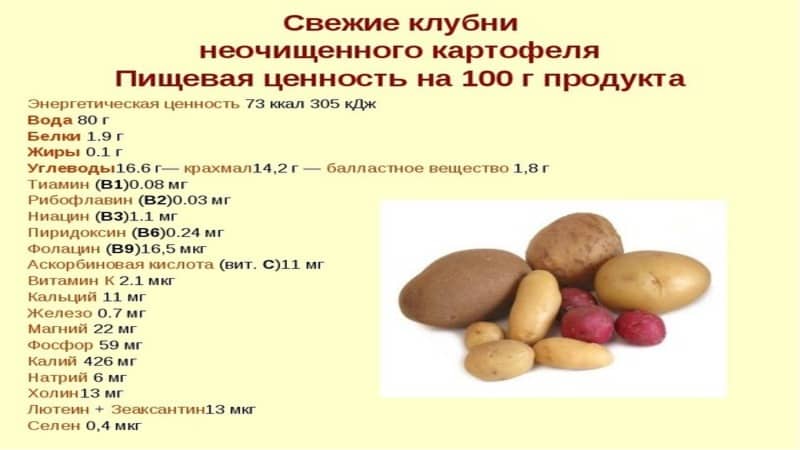
Calorie content, BJU, glycemic index
Compared to other vegetables, the calorie content of potatoes is significantly higher. This is due to the large amount of complex carbohydrates (mainly starch) in the composition:
- Raw potato tuber has 75-76 kcal per 100 g.
- The glycemic index directly depends on the method of preparing the vegetable: the highest GI in mashed potatoes is 90 units, in boiled potatoes it is 65 units.
- 100 g of product contains 3% daily protein, 0% fat, and 6% carbohydrates.
Is it possible to gain weight from potatoes?
There are two main reasons why people get fat from eating potatoes:
- Using sunflower oil when making fried or french fries. Oil increases the calorie content of dishes and promotes maximum absorption of fats. Abuse of such food leads to obesity, atherosclerosis, diseases of the cardiovascular system and even oncology.
- Excess carbohydrate intake. During digestion, they turn into glucose, penetrating into the blood and increasing its sugar level. Glucose releases energy for the body to function. If you don't use it completely, it gets stored in body fat. As a result, the person gets better. To prevent this from happening, consume no more than 100 g of potatoes per day.
Boiled
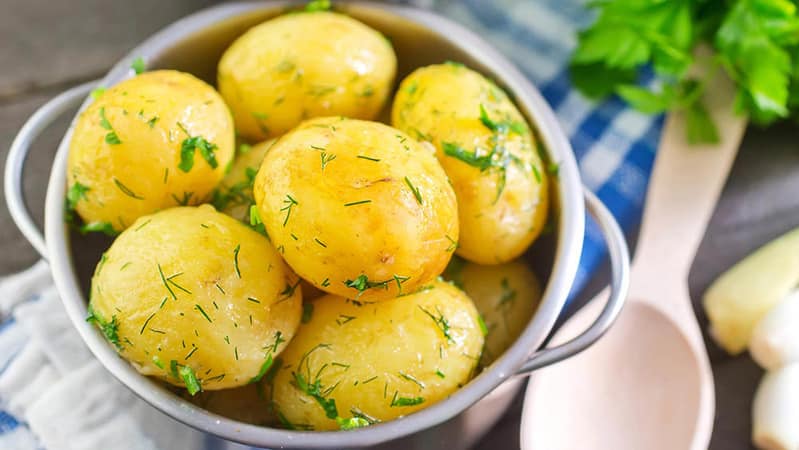
Boiled potatoes are the most dietary option:
- boiled potatoes “in uniform” is similar in calorie content to raw - 77-78 kcal per 100 g;
- The calorie content of tubers boiled in water without skin is higher - 80-85 kcal, in milk - 95 kcal.
The number of calories increases noticeably when adding butter or vegetable oil to a dish. So, a teaspoon of sunflower oil is another 45 kcal, and a teaspoon of butter is 35 kcal.
Many people wonder if boiled potatoes with onions, mushrooms and other ingredients make you fat:
- boiled potatoes with onions fried in vegetable oil contain 125 kcal per 100 g;
- dish with mushrooms – 102;
- crushed boiled potatoes with milk – 97;
- with lard – 171 kcal.
You can gain weight from boiled potatoes if you do not follow the recommendations of nutritionists, eat a lot, generously seasoning the dish with oil. To preserve the maximum amount of useful elements, experts advise steaming or peeling the root vegetable. You can reduce the calorie content by keeping the potatoes in water for 2-3 hours.
Fried
Those who get fat from potatoes are mainly those who eat them fried. The calorie content of this dish directly depends on the amount of oil added to it:
- potatoes fried in vegetable oil in a frying pan have from 198 kcal;
- Potato chips and French fries have the highest calorie content - over 316 kcal.
Baked
Baked potatoes have a calorie content of 85-92 kcal per 100 kg. Baked in the oven – 98 kcal. When butter is added to it, the calorie level increases to 105-108 units. Nutrition experts recommend reducing these indicators by adding sunflower or olive oil rather than butter.
As a puree
The calorie content of puree is not much higher than the energy value of its boiled counterpart. The traditional method of preparing puree with butter and milk has no more than 133 kcal per 100 g.
You can reduce the calorie content of a dish by eliminating one of the ingredients (butter or milk). The energy value will decrease to 128 kcal if you prepare the puree with a raw egg instead of milk and vegetable oil instead of butter.
Other
Other potato dishes have the following calorie content per 100 g:
- stewed potatoes with vegetables and chicken – 175 kcal;
- potato casserole – 110 kcal;
- soup – 40 kcal;
- fried pies with potatoes – 185 kcal;
- potato pancakes, zrazy – 268 kcal;
- dumplings – 148 kcal.
As for potato dumplings and pies, the calorie content of the dough is also added here.
How to cook potatoes correctly so as not to gain weight
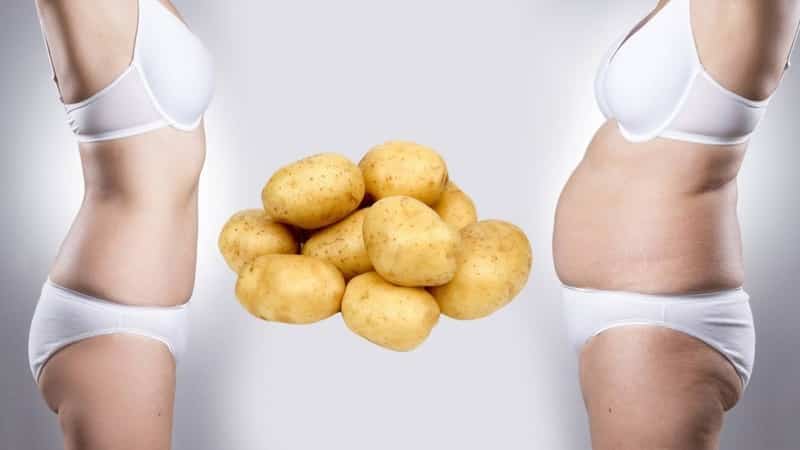
You can’t give up potatoes completely – they themselves are very beneficial for the human body. But so that he doesn't harmed, but brought benefits, remember a few simple secrets:
- Cook without oil. The calorie content of a potato dish will increase three times if you add butter or sunflower oil to it.
- Cook in its uniform. When cooking, make sure that the potatoes do not overcook and the skins do not peel off. By the end of cooking it should be “half-cooked”. Afterwards, the potatoes should be kept in a closed pan for a while so that they reach readiness on their own.
- Throw the potatoes into already boiling water.
- Serve the meat separately. Starch and protein are not the best duet for proper digestion. To digest potatoes and meat, different substances are needed that neutralize each other’s effects. Therefore, the body cannot process protein and starch at the same time.
- Eat in small portions. Often people gain weight not because of the calorie content of the dish, but because of the serving size. Potatoes are not a vegetable that can be eaten in large quantities, so it is better to avoid the additive. Experts advise eating potatoes no more than 2 times a day, 200 g each.
- Eat potatoes in the morning. Complex carbohydrates are instantly deposited on the waist. In the evening, it is more difficult for the body to utilize them, so nutritionists do not recommend eating potatoes after lunch.
What to eat potatoes with to avoid gaining weight
To avoid gaining weight, eat potatoes with herbs and vegetables (except tomatoes). The duet with celery root salad goes well.
Using 1 egg and 10 g of butter, you can prepare potato cutlets. Puree the ingredients, add salt, shape the mixture into an oval shape and bake in the oven.
It is recommended to add a spoonful of horseradish to regular mashed potatoes. It speeds up metabolism and stimulates the digestion process.
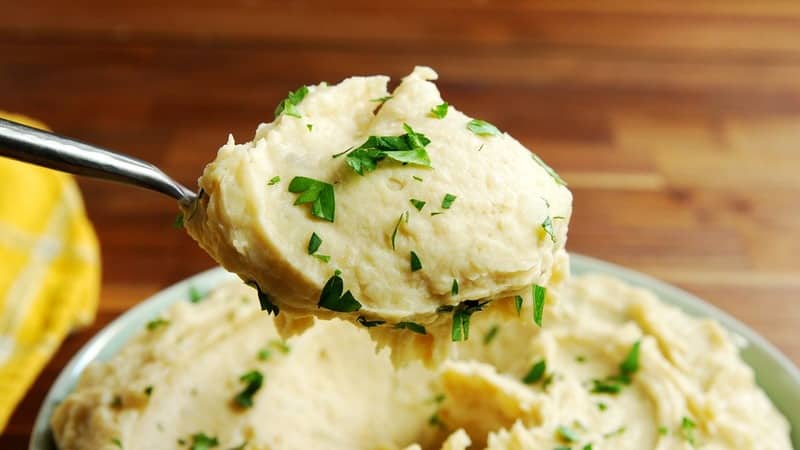
What you should absolutely not eat potatoes with
It is important to separate proteins and carbohydrates, so it is not recommended to eat potatoes with meat and fish. This combination slows down the digestive system, causes fermentation of carbohydrates, a feeling of discomfort and heaviness in the stomach.
If you are watching your figure, you should not eat potatoes with butter, lard, tomatoes and bread.
Potato diets
The potato diet is not a myth. By consuming this vegetable, you can lose 3 to 5 kg in a week. The main rule is not to add spices, salt, or dressings (mayonnaise and ketchup) to the dish.
Strict potato diet
Diet helps lose weight by 3 kg in 3 days. The diet contains only potatoes. Nutritionists do not recommend sitting on it for more than 5 days.
Bake the root vegetable without salt, oil or spices in the oven. You need to eat it 6 times a day. It is worth supplementing the diet with plenty of fluids and a vitamin complex.
A varied diet
This diet includes other foods besides the potato tuber, but this does not make it any less effective. You should eat this way for no more than 5 days. During this time you can lose 4 kg:
- Breakfast - 1 tbsp. kefir or skim milk.
- Lunch - mashed potatoes in water without salt and oil.
- Dinner. Salad of 250-300 g of potatoes, salt, vegetable oil and 1 boiled chicken egg.
- Before going to bed, drink a glass of warm water.
Long-term diet
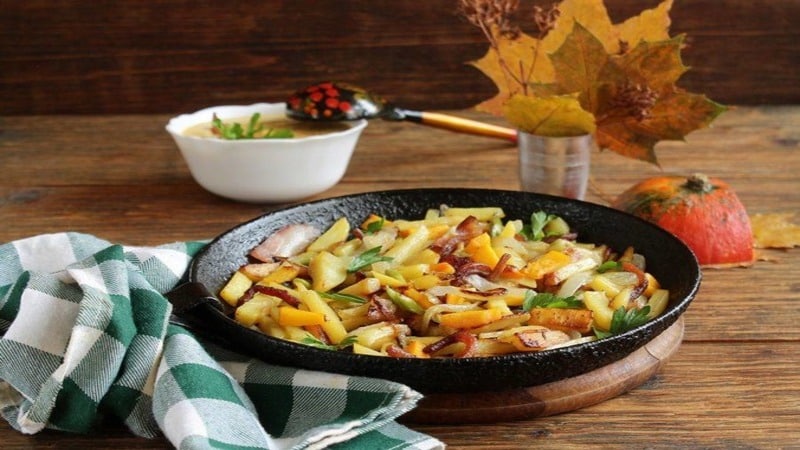
The third type of potato diet is designed for those whose excess weight is more than 10 kg. You will have to sit on it for 14 days:
- Days 1-3 - consume oven-baked potatoes without spices and oil in equal portions throughout the day;
- 4–10 days - the same diet in the form of baked potatoes, but with the addition of salt and olive oil if desired;
- Days 11–14 - mashed potatoes with the addition of oil, herbs, vinegar, pepper or lemon juice.
An effective diet allows you to get rid of 8-9 kg.
Conclusion
You can gain weight from potatoes if you eat them in large quantities and cook them with oil. Fried potatoes have the most calories, while boiled and baked potatoes have the least calories.
The best pairing for a potato dish would be vegetables and herbs. Do not eat the root vegetable with meat, fish and tomatoes. Potatoes will help you lose extra pounds if you follow a diet based on them.